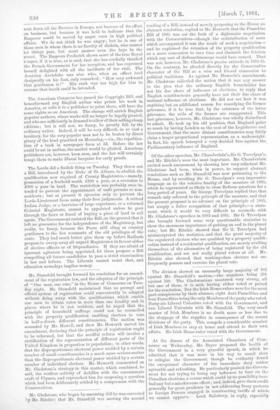Of the other speeches, Mr. Chamberlain's, Sir G. Trevelyan's, and
Mr. Ritchie's were the most important. Mr. Chamberlain excited much amusement by showing how very reluctant Mr. Gladstone had been, when in power, to support abstract resolutions such as Mr. Stansfeld was now presenting to the House, and by recalling Sir G. Trevelyan's very impressive language as to the relative finality of the measure of 1885, which he represented as likely to close Reform questions for a long period of years. Sir George Trevelyan replied that that remark only referred to the principle of the measure, and that the present proposal is no advance on the principle of 1885, but simply a fuller recognition of that principle,—a state- ment which it would be very difficult to reconcile with Mr. Gladstone's speeches in 1884 and 1885. Sir G. Trevelyan also brought forward some very questionable statistics to show the enormous importance of putting an end to the plural vote; but Mr. Ritchie showed that Sir G. Trevelyan had misinterpreted the statistics, and that the great majority of the registered electors who are qualified by a property qualifi- cation instead of a residential qualification, are merely availing themselves of the alternative of being registered by the old qualification, and are not really plural voters at all. Mr. Ritchie also showed that working-class electors not un- frequently possess and exercise the plural vote.






































 Previous page
Previous page